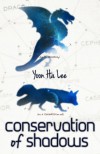Currently reading
Chasing New Horizons by Alan Stern and David Grinspoon

All you ever wanted to know about Pluto.
Actually, it covers the history of Pluto including its discovery by Clyde Tombaugh, then the early attempts to get NASA to fund a mission to Pluto, the struggles the New Horizons mission went through, and wraps up with some of the more important discoveries made at Pluto. And you know what? It does all that with minimal physical descriptions of the people involved, although some photographs were included.
This book comes down hard on the side of the line supposedly favoured by planetary scientists, that dwarf planets are planets, so if you were disappointed with Pluto's demotion, take heart, and dive in for some NASA politicking.
I only had one nitpick, and that was that the book assumes that its readers are more familiar with miles than kilometres, despite the team presumably working largely with kilometres. So it has some weird transitions, like where it's discussing the range of possible Pluto approaches in km and then switching to miles when relaying its final choice. For the most part, I don't care whether a book about astronomy talks about km or miles since neither unit is particularly useful in that domain; it's only when you start talking about terrestrial distances where I feel it matters. I mean, in astronomical matters numbers in both units can basically be translated as "lots". A better illustration of the distances and speeds involved is to say that it took New Horizons thirteen months to get to Jupiter and another eight years to get to Pluto. (!)
Anyway, if you want to learn more about the background of the New Horizons mission to Pluto as well as some of the trade offs that were made both prior to and during the mission, I'd recommend you pick this up.














 12
12
 3
3
